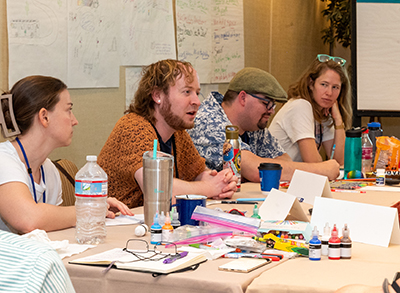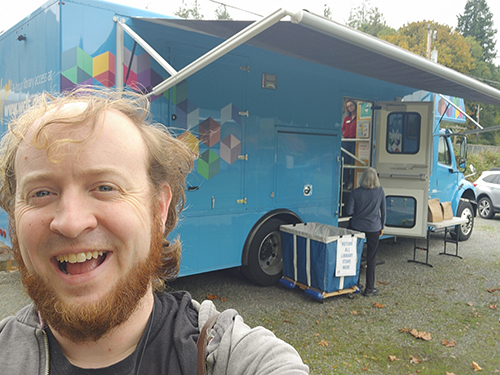The Penson Boards interviews the Rev. Davi Weasley, Pastor of First Congregational Church of Bellingham, Washington, about the impact of the NGLI program in their life and ministry, and their perspectives on church challenges and opportunities.

Q: What drew you to the NGLI program?
When I applied for NGLI, there were a couple of things that drew me to the program. It’s always lovely to have some more resources for continuing education, and some more resources in my pension. But what was particularly exciting was working with a cohort. I realized the value of a clergy peer support group, and I've always found those spaces helpful.
As we've built trust with each other, we've been able to do some truly important work. Sometimes this work has been in the classroom, or when we've met over Zoom. But oftentimes this work has been through less formal conversations in our pretty active text thread where we share resources, questions, and prayers. The NGLI program allows us to be with each other in moments of joy, panic, and real confusion.
Q: In what way did the NGLI program and its educational leadership training impact your life or ministry?
“The NGLI program has been more about being in a community of wisdom, care, and growth.”
I think my experience with NGLI’s educational offerings has been less about profound realizations regarding myself, and more about how these educational and one-on-one spaces help me process the learning and growth that’s been happening over time. These years have been challenging and intense for all of us, but having regular places for reflection and analyses of what's happening in my congregation has been super helpful. I don't know that there's exactly one moment when I thought, “Oh yeah, I learned this thing.” The NGLI program has been more about being in a community of wisdom, care, and growth.
Q: How are clergy navigating their personal finances?
Too often, the clergy I know and love are put in difficult and precarious financial positions because they love their work and they love their churches, but their churches are not paying them a living wage. Finances are stressful and can be a source of shame and embarrassment. This is part of a much wider challenge in our congregations, and even in our culture. We should be providing our clergy with resources teaching them about financial planning and asset management, but it won’t keep somebody out of a precarious financial situation if their church is underpaying them.
Q: Describe some of the challenges the church is facing today?
For many congregations, especially in historically white mainline Protestant congregations, the pandemic advanced the clock on changes that were already happening. On the positive side, many of us took a big leap forward in terms of technological proficiency, even though we should have been doing this a decade ago. But the pandemic was the impetus to figure it out right away.
Additionally, folks who had already been drifting away or a little disaffected from the congregation, left the congregation during the pandemic. (Not to mention those who we also lost to death or relocation in the midst of Covid!) It was my first time serving in a context where everybody was simultaneously in crisis. There are ways it strengthened us, and there are ways it depleted some of our resources in terms of finances, energy, and who had the will for new projects. Some of my church folks had energy for a set amount of change for the next 10 years, and they spent it all in March of 2020. Since then, they haven't had that same level of willingness to try things out, or their creative muscles are only just now coming back.
Q: What are some of the opportunities you see for the future church, especially arising out of the pandemic?
Many have moved to online church, and I think it’s great. Selfishly, I miss those folks. But, in my congregation, we do a beautiful live stream worship service. It's such a lovely way for folks who might have trouble accessing our worship wherever they are. I think if we had been doing our jobs as churches and really listening to people with disabilities, we would've been live streaming 10 or 15 years before the pandemic. So it's on us that it took us so long, and it took such an extreme situation.
“As churches get smaller, there's an opportunity for us to get weirder.”
As churches get smaller, there's an opportunity for us to get weirder. And I mean that with a lot of care and affection. This is an opportunity for churches to really find who they are and what they're good at. Churches don't need to be all things to all people because that's not a sustainable model of ministry anymore.
Some congregations have been turning inwards, a kind of protecting what they've always had. They say, “Let's keep doing things the same way.” And that model has never been particularly sustainable. The wheels are coming off of that model! Sometimes that means closing, but sometimes that means getting curious and being willing to try new things that will likely fail. I think it’s important to have more spaciousness, fun, and sustainability in ministry, to be creative and not fixed on the past or the way things were done before.

Rev. Davi grew up in Western New York and studied at Oberlin College and Chicago Theological Seminary. In addition to theology, they have a background in spiritual direction, community organizing, and storytelling. They are passionate about communities that celebrate people for things other people have rejected. Their partner, Rachael Weasley, is a church planter at Community of Hope Mennonite Church, and their kiddo, Ezekiel Grace (age 5) is a tireless student of building and play. Davi would like to hear about your Dungeons & Dragons character.
